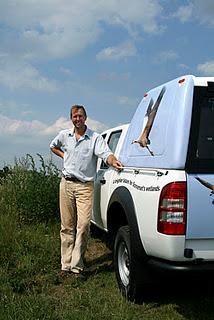 Produced by the RSPB’s award winning film unit, Born to fly traces the epic journey of cranes as they migrate from their breeding grounds in Northern Europe to Iberia, and describes how these magnificent birds have been returned to Somerset for the first time in 400 years through the Great Crane Project.Every year a quarter of a million cranes, one of the world's highest-flying birds, undertake the gruelling voyage south to the sun-drenched oak woodlands of Spain and Portugal where they spend the winter — but a third of each year's new young cranes don't survive long enough to complete the journey back to their northern breeding grounds.
Produced by the RSPB’s award winning film unit, Born to fly traces the epic journey of cranes as they migrate from their breeding grounds in Northern Europe to Iberia, and describes how these magnificent birds have been returned to Somerset for the first time in 400 years through the Great Crane Project.Every year a quarter of a million cranes, one of the world's highest-flying birds, undertake the gruelling voyage south to the sun-drenched oak woodlands of Spain and Portugal where they spend the winter — but a third of each year's new young cranes don't survive long enough to complete the journey back to their northern breeding grounds.Members of the RSPB’s film unit team were there every step of the way to capture all the heart-warming and harrowing moments, including the breath-taking crossing of the Pyrenees. This is the amazing story of an intelligent bird, a born survivor, with an uncanny ability to adapt in an ever-changing world.
During production, the RSPB’s cameraman Toby Hough spent over 300 days filming on location in some of Europe's wildest corners. His trek took him across Sweden, Poland, Germany, France and Spain before returning home to complete the story by filming the start of the Great Crane Project in the Somerset Levels and Moors.
Toby said: "Born to fly is the most ambitious and challenging project the RSPB has ever filmed. It was hard to be away from home for so long, the days were long and often freezing cold. I missed my family a lot, but seeing the end result has made all the hard work worthwhile.”
To mark the DVD launch, the first public screenings of Born to fly will be held at Taunton Conference Centre, Somerset College of Arts and Technology, on 30 November.
Alongside the film there will be a presentation by the Great Crane Project manager, Damon Bridge and members of RSPB Film Unit will be on hand to provide insights into the making of the filmThe Great Crane Project is now in its second year. It is a partnership between the Wildfowl & Wetlands Trust, the RSPB, Pensthorpe Conservation Trust and Viridor Credits Environmental Company. To date it has successfully introduced 34 birds to Somerset from a donor population in Germany.
Great Crane Project manager, Damon Bridge, commented on the work: “The project is going really well. Obviously there’s a long way to go, but we now have a free flying population and it’s hoped that in a couple of years these young birds will pair up and settle down to nest. That’s the moment we’re all eagerly awaiting, that sight of the first wild chicks in the county since the 17thCentury”.
As a unique insight into the methods employed in re-introductions such as this there will be a selection of the paraphernalia of the project on display at the screenings - wooden decoys, radio-tracking kit, transmitters, rings, incubators and the “crane-parent” suits the project team wear.
Sarah Webb, who’s organised the evening for the RSPB said; “This is a wonderful opportunity to find out more about what the cutting edge of wildlife conservation is all about. This is an ambitious project, but I’m sure everyone who watches this film will be left understanding just why we are so committed to bringing this beautiful bird back to the Somerset Levels and Moors.”
For more information on the Great Crane Project visit www.thegreatcraneproject.org.uk
The film is being shown at Taunton Conference Centre, Somerset College of Arts and Technology. There will be a matinee at 2 pm and an evening screening at 7. 30pm. Price: Adults £10, children £6 Booking is essential and you can get tickets by calling 01392 432691 (Monday to Friday 9am to 5pm).For more details visit http://www.rspb.org.uk/events/details.aspx?id=tcm:9-291039 © Phil Pickin

